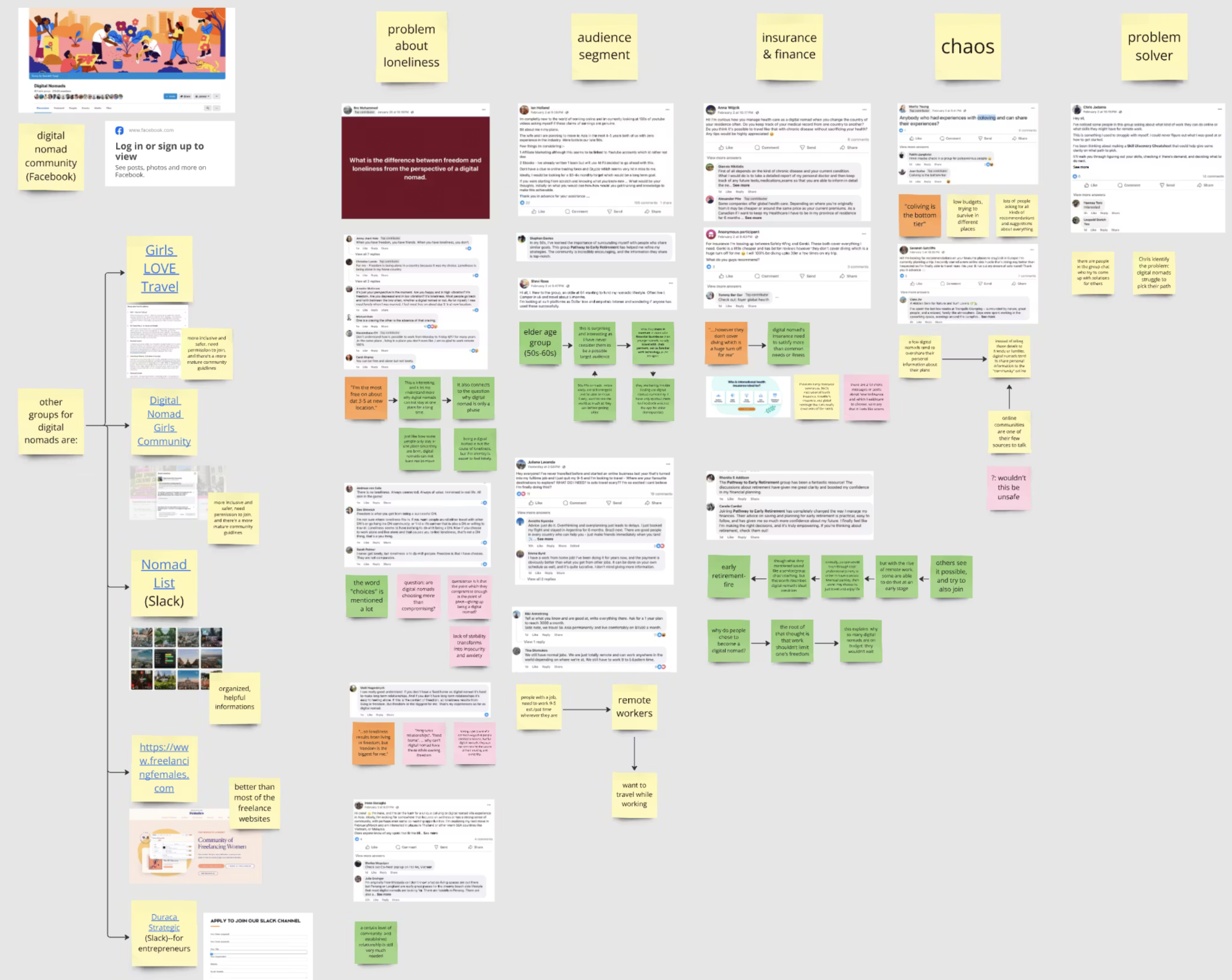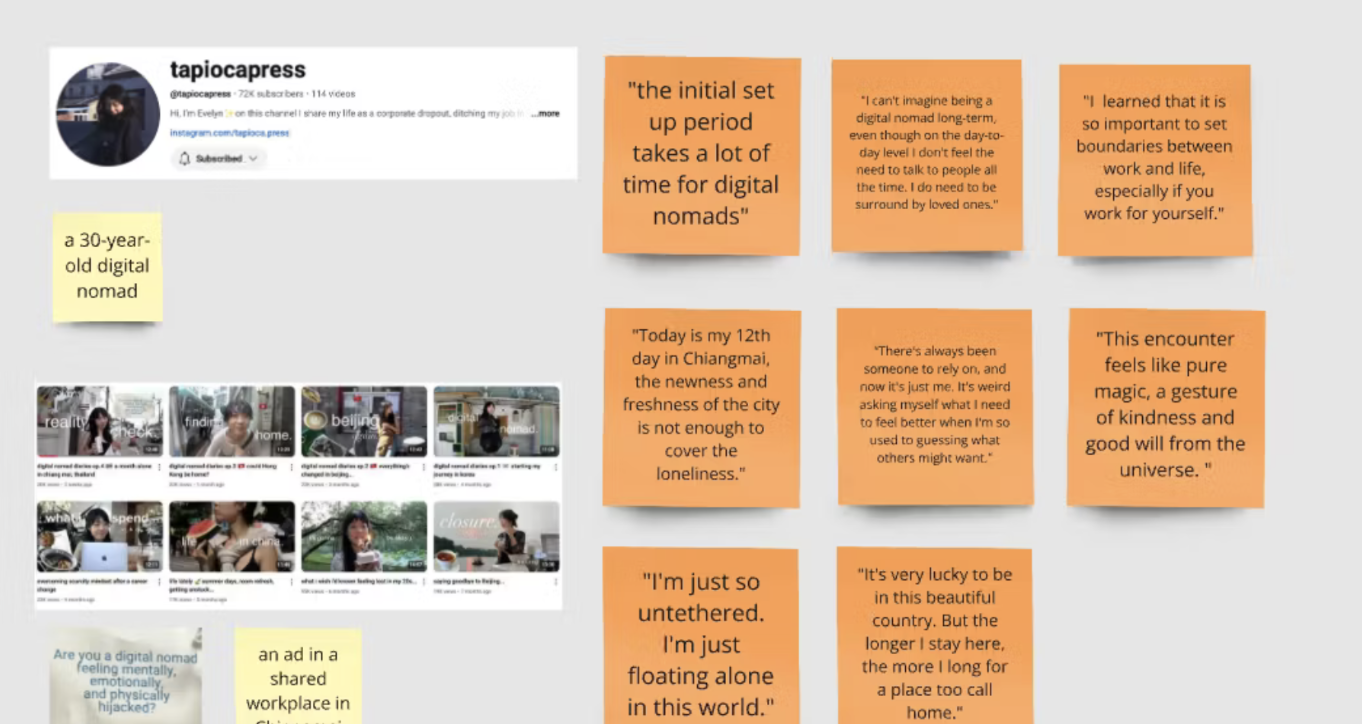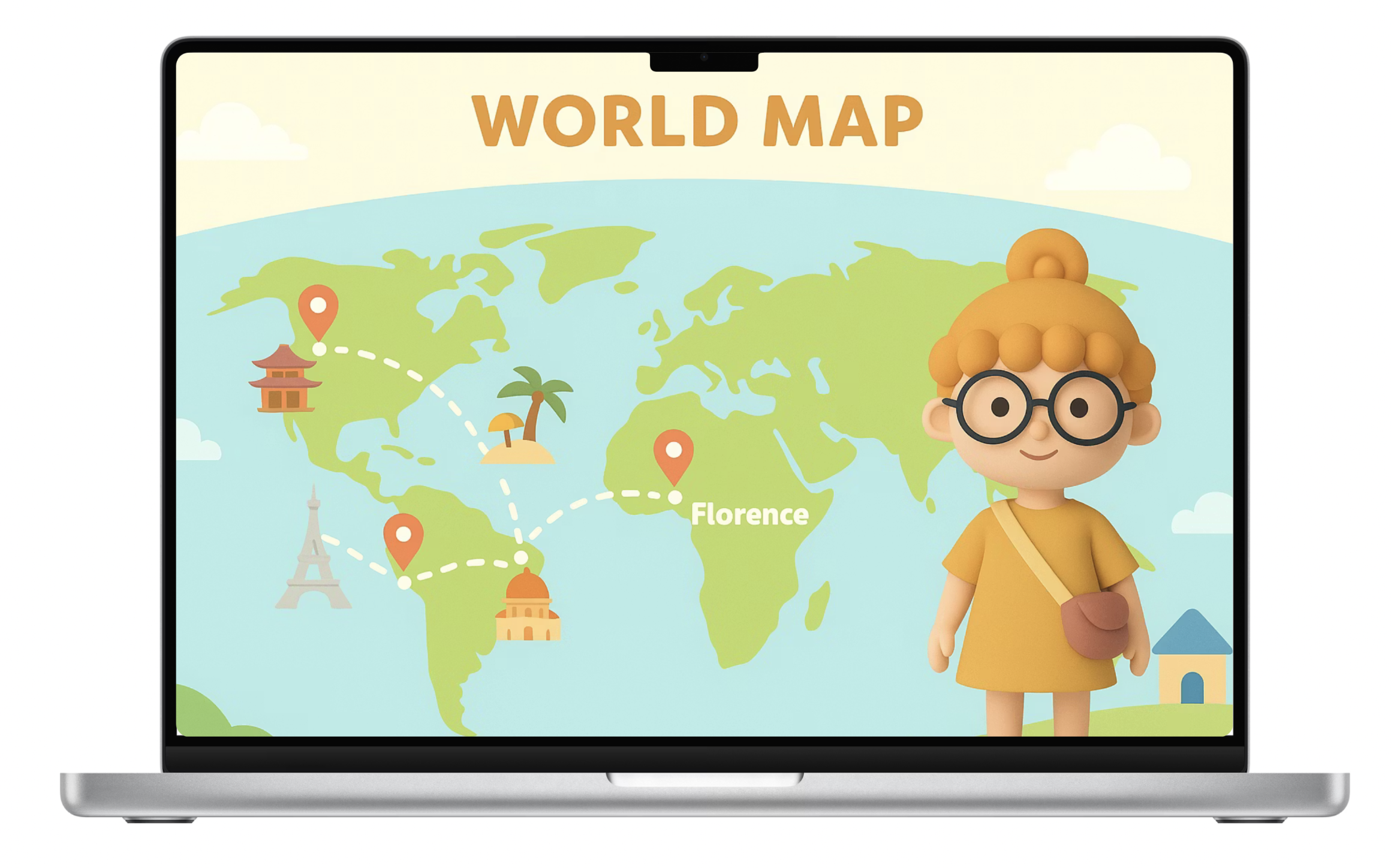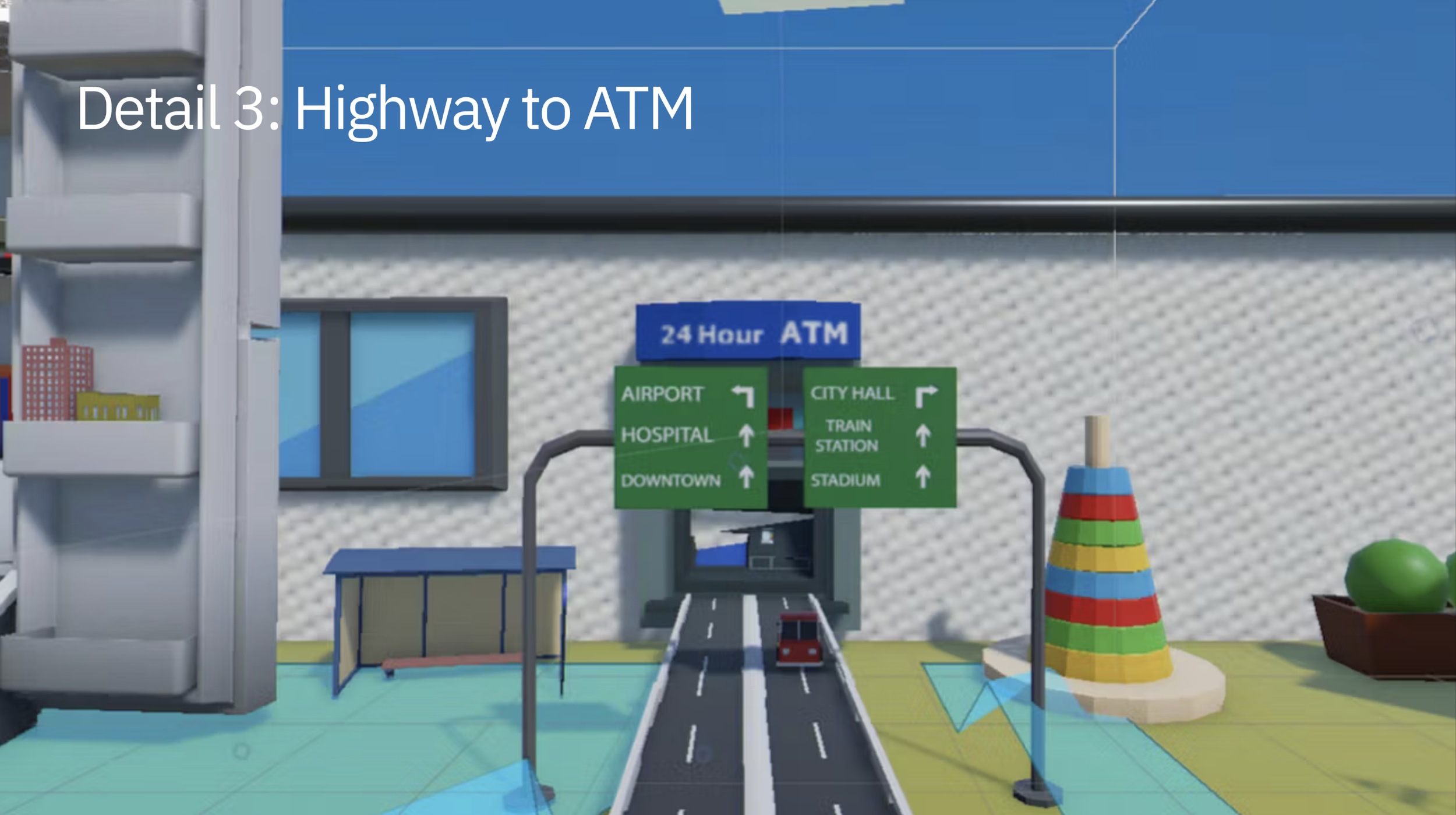Next Stop
is a location-based cozy simulation game designed to capture the real emotional and practical journey of living nomadically all through small, cozy games inspired by REAL nomadic journeys.
About
As remote work becomes more common, I began meeting more people who introduced themselves as digital nomads. When I first heard the term and listened to their stories, I was fascinated by the possibility of living and working while constantly on the move. But as I dug deeper, I discovered the emotional and practical challenges many nomads face. This project aims to explore those tensions while making digital nomadism more visible, relatable, and accessible through an interactive, story-driven experience that connects nomads and non-nomads alike.
Design Process
Ideate
Location
New York
Duration
3 months
Project
Digital Nomad Case Study
Year
2025
Research
Define
Prototype
Game Dev.
Testing
Marketing

Research
This project focuses on two key groups: aspiring digital nomads who hesitate to start, and early-stage nomads (3–6 months in) who are struggling to adapt. They may be hybrid workers, students, or those newly shifting away from traditional 9–5 roles, driven by a desire for freedom but in need of community, structure, and support. By addressing their pain points, the project aims to guide them toward a more sustainable and fulfilling nomadic experience.
Based on these research, I started my interviews:
Echo
Private foundation owner, 5th year into the digital nomad journey
Emily
Working remotely in HongKong, hesitate about becoming a nomad
Initial Desk Research: gathering information about common pain points, accessibility, and nomad popular countries.
Online Ethnography: online nomad community observation, understanding my target audience
"One thing that no one talks about is that the initial set up period takes a lot of time for digital nomads."
– Evelyn, tapiocapress
Zelia
Freelance photographer and graphic designer, 3rd month into the digital nomad journey
Freydís
Collage graduate in Iceland, love traveling
Pipi
Content creator with over 3M followers, 3rd year into the digital nomad journey
Key Quotes to Insights
“It's just your perspective in the moment. Are you happy and in high vibration? It's freedom. Are you depressed and in low vibration? It's loneliness. Most people go back and forth between the two often, whether a digital nomad or not. As for myself, I was most lonely when I was married. I feel most free on about day 3–5 at new location.”
— Jennifer (from online ethnography research)
“Oftentimes, it's easier to feel lonely or sad, because all you can relay on is really just yourself.”
— Zelia
“If I don't get enough money and I'm in the middle of traveling, I will be scared. I'm not sure what working while traveling would even feel like.”
— Emily
—>
—>
—>
Opportunities:
✈️ Nomads chase "elsewhere," not destinations
Many nomads move quickly — not because they want to "see everything," but because the feeling of freedom fades after just a few days. For them, it’s not about being anywhere — it’s about being elsewhere.
🧍♀️ Living solo on the move is emotionally exhausting
Another insight is that for people who settle longer at a place, they struggle from being an one-person army all the time. Managing life and work alone, handling every decision alone, struggling to sustain meaningful friendships while living in constant motion.
❓ Aspiring nomads don’t know what to expect, and feel alone in their hesitation
I also observed that for those dreaming of starting a nomadic life —many hesitate for months, even years, unsure if they can handle the unknowns —afraid of leaving behind stability without a real sense of what life on the move will actually demand.
Define
How might we help nomads and future nomads prepare for the emotional realities and everyday obstacles of a life in constant motion?
How might we turn the invisible challenges of nomadism into experiences that are visible, shareable, and relatable?
Ideation
30+ brainstormed ideas includes some concepts such as: personalized travel soundtrack generator, nomad badge system, digital passport system, AI-powered travel “detour” generator, virtual travel dice, digital draft bottles, emotion-based travel planner,...etc.
All of those pointed to an app, but do digital nomads need another app ?
Realized:
users wanted practice, not just reflection
Need:
something people could feel through — not analyze
Why a game?
Safe, low-stakes way to explore emotional reality
Allows rehearsal, empathy, lightness
Could be rooted in real stories and true struggles shared by interviewees
Design goals:
Make the invisible parts of nomad life visible and sharable
Blend cozy visuals with meaningful decision-making
Give both nomads and non-nomads something to connect over
Asked:
What if they could play it?
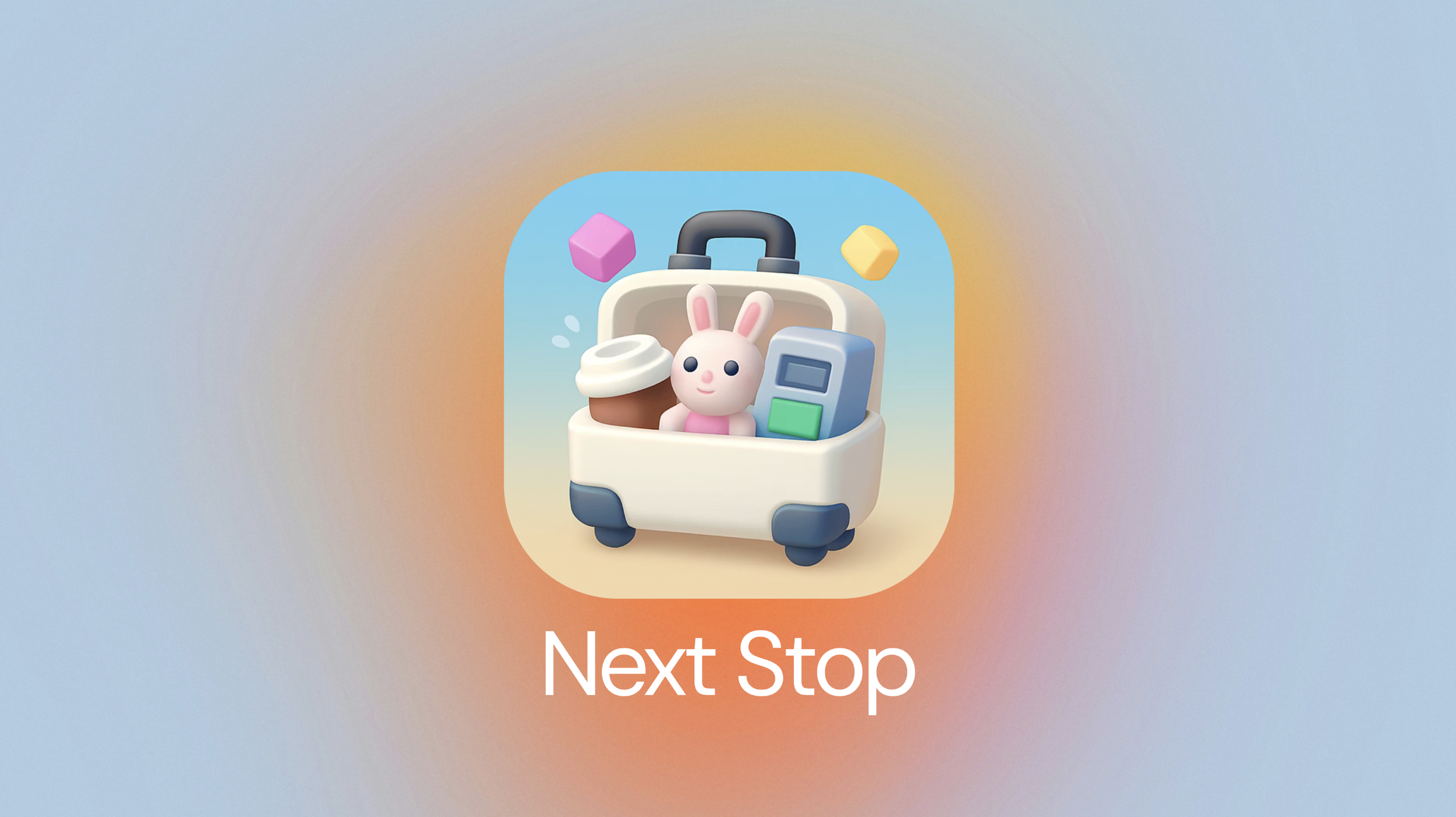
Prototype
Welcome Page
Information Page
Players start by creating their character — customizing their look and entering their hobbies and strengths. Based on that, the game suggests a freelance path, like writing, photography, or consulting — but they can change it as they go.
Map View
This is the in-game map — a visual record of where you’ve been and where you’re headed. Players unlock cities over time, opening new missions and soft connections with others who’ve reached the same place. And for those who want a more immersive experience, there’s also an optional location-based mode — where the city you’re in shapes what you can access.
Player Home Page
From there, they go on finding small freelance gigs, managing their time, money, and energy.
Mini games examples:
Note: Every mini-game is inspired by something real — from the challenge of cooking with limited groceries, to late freelance payments, to the packing struggles that come with low-cost flights. These light, interactive missions give players a playful way to experience what real nomads go through.
“Occasionally, you’ll get a message like: ‘A traveler nearby just unlocked their suitcase. Want to explore?’” This means there are new players visiting your area.
The player will then enter: Suitcase Quest

Game Dev. & User Testing
This mini mission is inspired by Pipi, a nomad of five years, who said packing is still her biggest struggle.
It made me realize: packing isn’t just about space — it’s about choosing what parts of your life to bring with you.
So in this quest, one player packs a suitcase however they want to, from a childhood bedroom, a favorite mug, or even a whole bridge from their hometown. Another player enters, collecting cubes and dodging a deadline monster — unlocking the next step for them both. It’s a light, playful way to get to know someone — before even saying a word.
As I set the basics up in Unity, I tested the player control with 3 people, and this is what they say in common: “Fun, but maybe the player speed is too slow.”
Thus, I adjusted the navigation speed quicker.
When the game is 80% finished, I did user testing again. And this is what they said:
“The way the character rolls to run around is so funny. Maybe adjust the camera position so that things don't collide? ”
— Caroline
“I suck at most games, and I would appreciate if this 'monster' could be slower..”
— Victoria
“The environment is so interesting, I could never imagine this world in a suitcase. ”
— Nirva
“Cute! I'd love to see a closer viewpoint so that it's more immersive. "
— Clair
When the game is 80% finished, I did user testing again. And this is what they said:
“The way the character rolls to run around is so funny. Maybe adjust the camera position so that things don't collide? ”
— Caroline
“I suck at most games, and I would appreciate if this 'monster' could be slower..”
— Victoria
“The environment is so interesting, I could never imagine this world in a suitcase. ”
— Nirva
“Cute! I'd love to see a closer viewpoint so that it's more immersive. "
— Clair
Launching Strategy
Platforms
Pricing Strategy
Business Model
Launching Strategy
We’ll build momentum through a Steam Wishlist campaign, and partner with digital nomad communities like Remote Year to reach curious travelers.
Next Stop will launch on both Steam and the Nintendo eShop, playable on computers and the Switch.
This price point was chosen to:
→ Keep it accessible for students, casual gamers, and indie game fans
→ Signal a complete and polished experience (no ads, no paywalls)
→ Sustain ongoing updates and community support
Post-Launch Plan
Visibility will grow through cozy streamers and TikTok creators who connect with the game’s soft, reflective tone.
+
Offer a demo on Steam Next Fest or itch.io ahead of release
Run a limited-time launch discount (10–15%)
Host a Nomad Stories livestream: you + guest digital nomads reflecting on their real stories vs the game
Cross-post dev stories + behind-the-scenes on TikTok/YouTube Shorts
Drop seasonal content (new cities to unlock, new emotional missions)
Add modding features or journaling DLCs if demand grows
Collect testimonials for future console/mobile porting

Reflections
When I first started this capstone, I thought I would be designing a practical tool to help digital nomads manage logistics like taxes or time zones. But as I listened more closely to interviews, forums, and community spaces, I realized the real need was not productivity but connection. Many nomads were dealing with emotional fatigue, loneliness, and a quiet longing to be seen. That shift changed everything. As a designer, I focused on creating something soft, playful, and emotionally honest—an experience that feels cozy but reflective. As a project manager, I navigated major pivots, evolving the idea from a mood-tracking mirror to an interactive map, and finally into a layered game world. Through it all, I learned to follow curiosity, let go of assumptions, and keep the work rooted in real stories.



